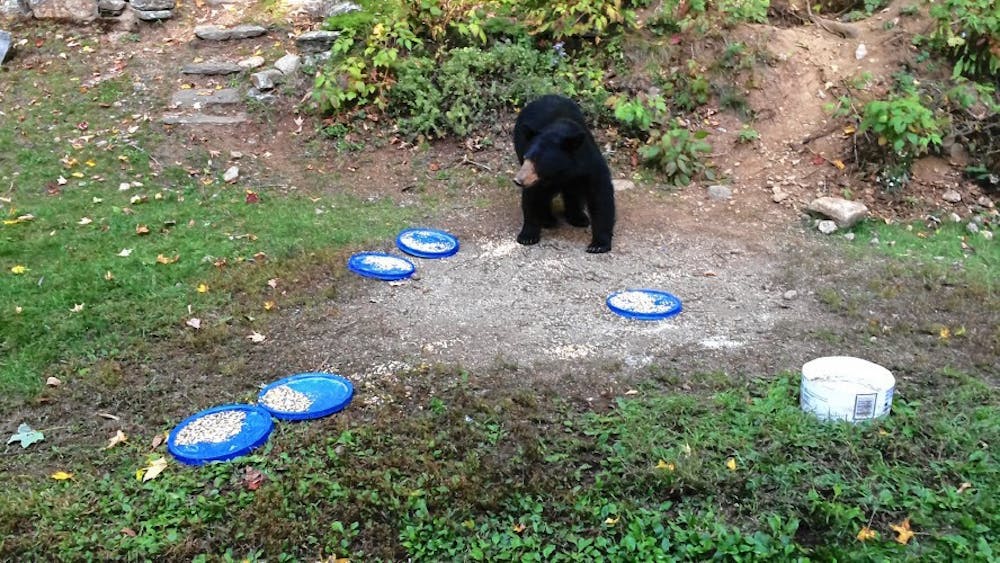WILMINGTON — Jim Burke has long been a friend of bears. Upon deciding to move to North Carolina, though, he is determined to ensure that his 62-acre property can still act as a “safe haven” for bears even after it is handed off to new owners. His proposition first received attention last week, after he pitched his idea for a wildlife refuge to the Wilmington Development Review Board.
In the week since the board meeting, Burke has quickly gained national press coverage on what has become known as a “wildlife refuge for bears.” First reported in the Brattleboro Reformer, the story was picked up by news organizations like CBS News and The Washington Post as Burke’s mission was incorrectly interpreted as a bear rehabilitation site, rather than a more general wildlife refuge. The attention increased as headlines labeled the property a “bear sanctuary.”
The selectboard is currently in the process of reviewing Burke’s proposition. According to the chair of the Development Review Board, Wendy Manners-Seaman, the board is assessing the ability of Burke’s proposed land use to meet zoning ordinance standards.
“I just want to ensure that my 62 acres remain a safe place for all animals that come onto my property,” Burke said. “That was my intent. It got a little twisted, you know; it’s the old telephone game.”
While Burke does not intend for the new owner of his land to continue the relationship he has cultivated with nearly a dozen bears that move through his property each year, he does at least want to prevent future hunting and trapping. He has kept “no hunting” signs around the private land since 2008. Upon moving, he wants to be assured that the trust he has formed with the bears will not be severed by new owners with an alternate agenda.
“I enjoy nature coming through,” Burke said. “But probably a little more than most people.”
Burke and his wife have counted as many as ten bears sitting out around their backyard on a cool summer night, and during peak seasons around 18 bears circulate through the property.
“This is a highly populated area for bears,” Mr. Burke said. “But I’ve decided that I could live with them.”
The first bear that Burke forged a relationship with is one he calls Mama Bear.
“I’ve had a relationship with her for 12 years now,” he said. “She’s brought cubs here every other year.”
Burke claims that when Mama Bear brings her cubs to his house, they have become so accustomed to him that he is able to scratch their noses and feed them out of his palm. Although he has become close to several bears, including ones he has named Nick, Ringo, George and Jill, his most infamous bond is that with Cocoa Bear.
“Everyone knew about Cocoa Bear around here,” Burke said. “People take bets on when I’m going to get mauled.”
Cocoa Bear was an orphan cub when Burke and his wife, Patty, first took him into their home in Wilmington. They started mixing formula for him, along with feeding him sunflower kernels and flaxseed for extra nutrients. Eventually Cocoa graduated to a diet of apples and granola. Burke said that the cub became so accustomed to him that he would sit in his lap.
“My wife and I just raised him as if we were his family,” Burke said.
Cocoa Bear left the residence after five weeks, but still returns to the area for around a month each year. Although it was a lot of work, Burke said it was an incredible experience that he would happily repeat.
When Burke first started having these close encounters in 2005, there were no laws issued in Wilmington to stop him from feeding the bears. In 2013, Vermont’s laws changed, and he then ran the risk of violating the law by intentionally feeding bears on his property.
Nearly one year ago, on Sept. 29, a search warrant was executed on Burke’s residence by two Vermont game wardens, Richard Watkin and Lt. Greg Eckhardt. The wardens had previously seen bears feeding from plates of food left in Burke’s yard. He claims that the game wardens illegally trespassed onto his private property to see this interaction.
A press release issued by the Vermont Fish & Wildlife Department in December 2016 explicitly blamed Burke for vehicles hitting bears near his property, which partially borders Route 9. He said that these claims are inaccurate and roadkill should be attributed to the fact that there are no wildlife corridors near his house for animals to safely cross intersections.
“I’ve been blamed for a lot of things,” he added. “Every time there’s an article about bears, I’m mentioned. The truth is I live with the bears.”
Environmental organizations have also noticed the conflict between major roadways and large animal migration. Although the Nature Conservancy is primarily concerned with the protection of land and waterways, it has recently become part of the Staying Connected Initiative.
“The project looks at corridors connecting wildlife activity,” said Lynn McNamara, director of Critical Lands for the Vermont chapter of the Nature Conservancy. “We’ve done a lot of mapping work that involve critical pathways.”
The state has worked with several organizations to protect land on both sides of the road to avoid these collisions with wildlife.
“We like to protect the land, but we recognize that owning one little island of nature preserve is not going to protect everything that exists around it,” McNamara added.
According to bear biologist Forrest Hammond, though, there’s a stark difference between protecting the bears, and humanizing them. “A bear that has been fed no longer behaves like a wild bear,” he said in the same press release issued last September. “These bears often go from house to house foraging for food and they gradually lose their fear of people. They can present a danger not just to the person feeding the bear, but also to their neighbors for many miles around.”
As the Review Board deliberates, Burke says that he’s stopped feeding the bears as frequently to prepare for selling the house. “They’re gentle creatures,” he said. “They might chase each other down into the woods, but I don’t fear them. They’re not aggressive.”
Although his life is closely linked to the animals now, Burke says he could not have imagined having this unique relationship when he first moved to Wilmington in 2002. Last week, the Burke property was officially put on the market and he will be leaving his community of bears for a home near Asheville, North Carolina, this coming week.
VT Resident Pitches Safe Haven for Bears

Courtesy of Jim Burke
One of the bears that frequents Burke’s property.
One of the bears that frequents Burke’s property.
Comments



